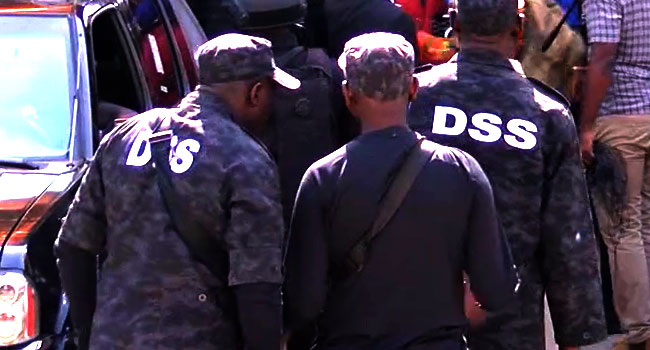THE Department of State Services (DSS) has asked a Federal High Court sitting in Abuja to admit into evidence statements made by three men accused of spying on American and Israeli interests in Nigeria on behalf of suspected Iranian handlers.
News Point Nigeria reports that the accused persons; Haruna Ali Abbas, Ibrahim Hussaini Musa, and Adam Suleiman were arrested in Kano and Lagos in 2013 and subsequently charged with terrorism-related offences.
They are standing trial on a 2014 charge marked FHC/ABJ/CR/129/2014, which links them to espionage and terrorist activities allegedly carried out under instructions from Iran.
At Wednesday’s proceedings, lawyers from both sides adopted their final written addresses in a trial-within-trial – a process ordered by the court to determine whether the extra-judicial statements made by the defendants were given voluntarily.
Counsel for the prosecution, Bello Abu, urged Justice Emeka Nwite to admit the statements, arguing that the defendants’ claim of being coerced was “an afterthought” intended to frustrate the case.
“The prosecution has shown through evidence that the defendants voluntarily made their statements. Their allegation of compulsion has no merit,” Abu argued, praying the court to admit the confessions and proceed with the substantive trial.
However, defence lawyers Aliyu Yawuri, Bala Dakun, and Bello Ibrahim insisted the statements were not voluntarily obtained and should therefore be rejected by the court.
After hearing arguments, Justice Nwite adjourned ruling on the admissibility of the statements to a date to be communicated to the parties.
According to the prosecution, Haruna Ali Abbas was arrested on March 16, 2013, at the Mallam Aminu Kano International Airport while returning from Lebanon.
He is accused of recruiting young Nigerians, including Musa and Suleiman, for terrorism training in Iran.
The DSS further alleged that Abbas: Attended terrorist meetings and rendered support for terrorism by facilitating training trips to Iran, compiled a list of American and Israeli targets in Lagos, including the US Consular Office, plotted their locations on maps, and transmitted the details to an Iranian contact, one Abu Ali, using encrypted email communication.
Musa and Suleiman, on their part, are accused of: conspiracy to commit terrorism by obtaining Nigerian passports and Iranian visas with the intent of travelling for terrorist training and conducting surveillance on US and Israeli embassies in Abuja, Kano, and Lagos in preparation for possible terrorist attacks.
With the adoption of final addresses in the trial-within-trial, the fate of the defendants’ statements now rests on the court’s ruling. If admitted, the statements could serve as key evidence for the prosecution as the substantive terrorism trial resumes.







